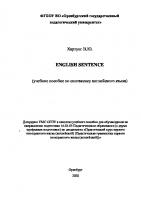Illocutionary Acts and Sentence Meaning 9781501700422
What is it for a sentence to have a certain meaning? This is the question that the distinguished analytic philosopher Wi
116 40 7MB
English Pages 352 [343] Year 2000
Contents
Preface
Introduction
PART I: THE NATURE OF ILLOCUTIONARY ACTS
1. The Stratification of Linguistic Behavior
i. Types of Speech Acts
ii. Illocutionary Acts
iii. Austin's Classification of Speech Acts
iv. Austin on the Rhetic-Illocutionary Distinction
v. Austin on the Illocutionary-Perlocutionary Distinction
vi. Austin's Characterization of Illocutionary Acts
vii. Interrelations of Sentential and Illocutionary Acts
viii. Perlocutionary Acts and Other Speech Acts
2. Perlocutionary Intention Theories of Illocutionary Acts
i. Explicating Illocutionary Act Concepts
ii. Grice on Speaker Meaning
iii. Schiffer's Account of Illocutionary Acts
iv. Criticism of Schiffer's Account
v. Counterexamples to Schiffer's Account
3. The Nature of Illocutionary Acts
i. Searle's "Non-Defective" Promising
ii. Taking Responsibility
iii. Epistemological Complexities
iv. Blameworthiness and Incorrectness
v. The Crucial Role of Rules
vi. Further Modifications of Searle's Analysis
vii. A New Analysis of Promising
viii. Extension to Other Illocutionary Acts
ix. De Re and De Dicto
x. How to Identify Conditions for Illocutionary Acts
xi. Illocutionary Rules
4. Types of Illocutionary Acts: Commissives, Exercitives, Directives, and Expressives
i. Prelude: Conventional and Normative Facts
ii. Commissives, Exercitives, and Verdictives: Preliminary
iii. The Final Model for Exercitives
iv. The Final Model for Commissives
v. Directives
vi. Expressives
5. Assertion and Other Assertives: Completing the Account
i. The Problem of Assertion
ii. Assertion as Explicitly Presenting a Proposition
iii. How This Account Deals with Problems
iv. Assertive-Nonassertive Overlaps
v. Kinds of Assertives
vi. Analysis Patterns for Illocutionary Act Types
vii. Restrictions on Sentential Vehicles
viii. Unintentional Illocutionary Acts
ix. Comparison with Perlocutionary Intention Accounts
PART II: AN ACCOUNT OF THE MEANING OF SENTENCES
6. The Problem of Linguistic Meaning
i. Meaning: Preliminary
A. The Concept of Meaning
B. What I'm Looking for in a Theory of Meaning
ii. Use as the Key to Meaning
iii. Sentence Meaning as Primary
iv. Sentence Meaning as Illocutionary Act Potential
v. Sentence Meaning and Perlocutionary Intentions
vi. Two Difficulties in the Illocutionary Act Potential Theory
vii. Intensifying the Difficulty
viii. Matching Illocutionary Act Types
ix. Illocutionary Rules
7. Illocutionary Act Potential and Illocutionary Rules
i. IA Potential as Subjection to Illocutionary Rules
ii. Linguistic Meaning as Rule Govemance
iii. Some Versions of Semantic Rules
iv. Progressive Complication of Illocutionary Rules
v. How to Handle Ellipticity and Singular Reference
vi. Reference, Ellipticity, and R'ing as Rule Subjection
vii. IA Analysis in Terms of Rule Subjection and in Terms of R'ing
viii. Some Additional Problems for IA Analysis
ix. IA's, I-Rules, IA Potential, and Sentence Meaning
x. Sample I-Rules and IA Analyses
xi. How I-Rules Make Communication Possible
xii. Speaker Meaning
8. The Status of Illocutionary Rules
i. Summary of the Foregoing
ii. Regulative and Constitutive Rules
iii. Unformulated Rules
iv. Rules and Conventions
v. Do I-Rules Exist?
vi. Drawing Boundaries around I-Act and I-Rule
vii. The Meaning of Subsentential Units
9. The IA Potential Theory of Meaning and Its Alternatives
i. Preview
ii. Initial Plausibility of the Theory
iii. Efficacy of the Theory in Application
iv. Replies to Objections
v. Mapping Alternative Theories
vi. Words or Sentences as Fundamental
vii. Naive Referential Theories
viii. More Sophisticated Referential Theories
ix. Truth Conditional Approaches
x. Attempts to Get Beyond Assertion I
xi. Attempts to Get Beyond Assertion II
xii. Conclusion
Appendix
Bibliography
Index
Recommend Papers

- Author / Uploaded
- William P. Alston
File loading please wait...
Citation preview
Illocu.,onary Ads anell Sen.ence lIean�n.
Also Ity Wjllja. P. Als.on: Divine Nature and Human Language: Essays in Philosophical Theology EpistemicJustification: Essays in the Theory ofKnowledge Perceiving God: The Epistemology of Religious Experience The Reliability of Sense Perception Philosophy ofLanguage A
Realist Conception of Truth
Religious Belief and Philosophical Thought: Readings in the Philosophy of Religion (editor) The Problems ofPhilosophy: Introductory Readings (coeditor with Richard B. Brandt)
Readings in Twentieth- Century Philosophy (coeditor with George Nakhnikian)
Illocui:�onary Aci:s and Seni:ence "ean�n. WILLIAM P. ALSTON
c Cornell University Press Ithaca and London
Copyright© 2000by°Cornell University
Library of Congress Cataloging-in-Publication Data
All rights reserved. Except for brief quotations in a
Alston, William P.
review, this book, or parts thereof. must not be
lllocutionary acts and sentence meaning I
reproduced in any form without permission in
William P. Alston
writing from the publisher. For information, address
p.
Cornell University Press, Sage House, 512 East
Includes bibliographical references and index.
State Street, Ithaca, New York 14850.
ISBN 0-8014 36 69-9 (cloth)
cm.
I. Speech acts (Linguistics) First published 2000by Cornell University Press
2. Semantics.
3. Grammar, Comparative and general Sentences.
I. Title.
Printed in the United States of America
P95.55.A47 2000 Cornell University Press strives to use environ
306.44-dc21
99-052786
mentally responsible suppliers and materials to the fullest extent possible in the publishing of its
Cloth printing
books. Such materials include vegetable-based,
1 098 7654321
low-VOC inks, and acid-free papers that are recycled, totally chlorine-free, or partly composed of nonwood fibers. Books that bear the logo of the FSC (Forest Stewardship Council) use paper taken from forests that have been inspected and certified as meeting the highest standards for environmental and social responsibility. For further information, visit our website at www.cornellpress.cornell.edu.
cs FSC
FSC Trademark© 1996 Forest Stewardship Council A.C.
SW-COC-









